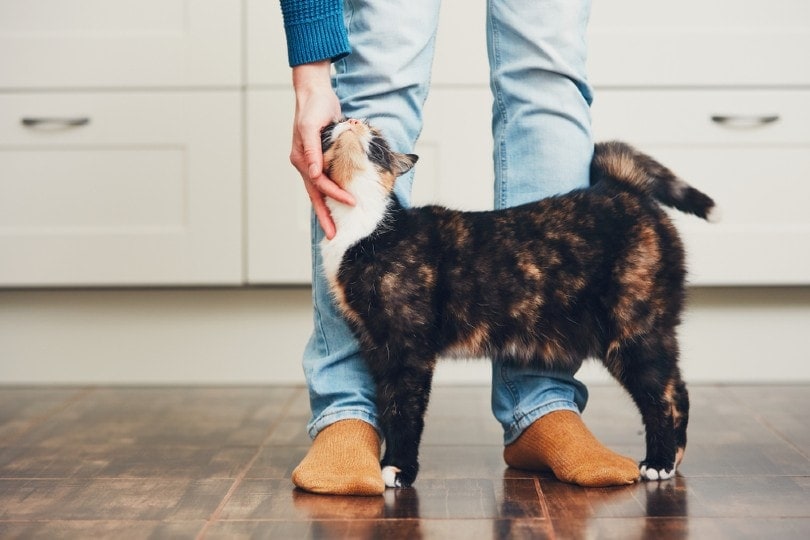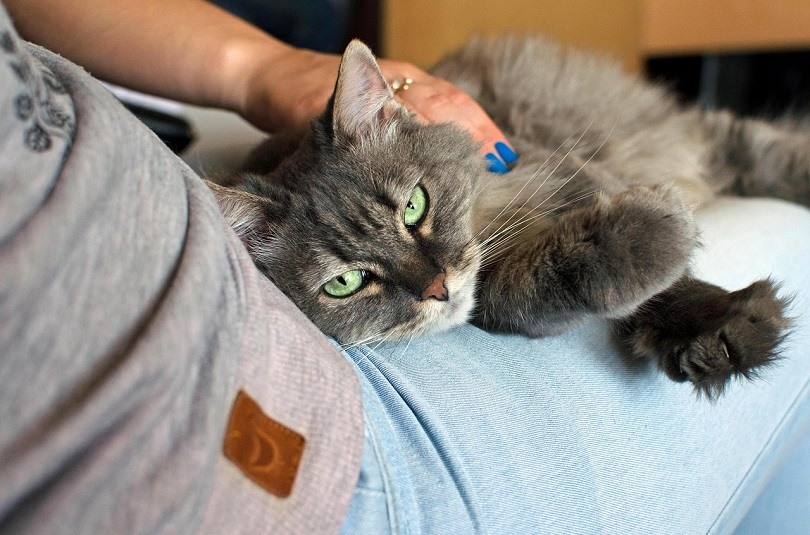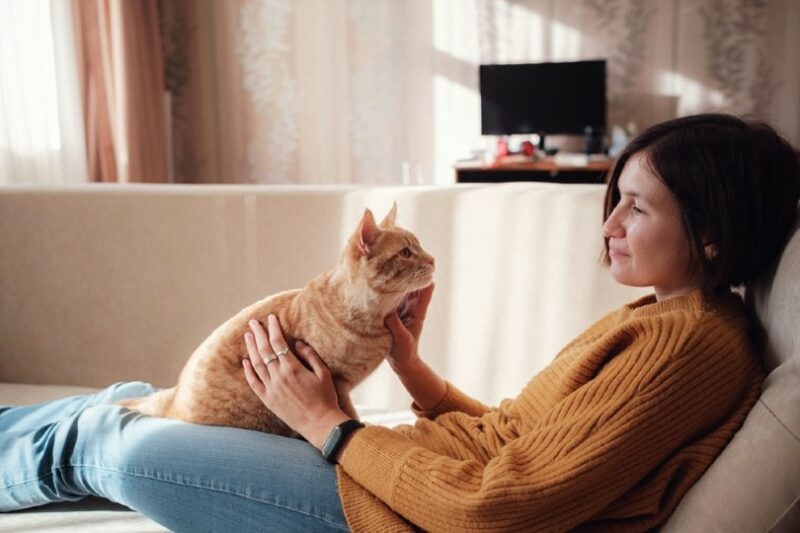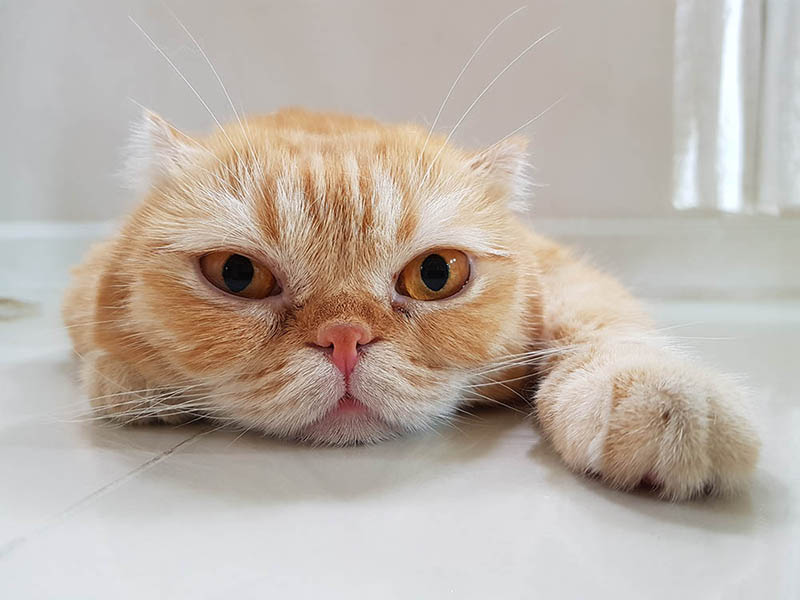Why Does My Cat Head Bump Me? 6 Common Reasons
Updated on

If you’ve ever owned a cat, you’ve probably noticed them bumping their head against you from time to time. This behavior is relatively common among cats. However, they do it for many different reasons, and it can sometimes be hard to interpret this behavior.
In this article, we’ll outline some of the most common reasons cats may bump their head against you. This list should help you figure out the cause behind your cat’s behavior.
The 6 Reasons Why Your Cat Head Bumps You
1. Affection and Bonding
Cats have scent glands on their head. Therefore, they may bump into you to mix your scent with theirs. In the wild, this is how cats maintain colony bonds and recognize one another. Mixing your scent with another cat symbolizes a level of trust and togetherness that cats can’t express any other way.
(Their scent glands are also why they rub up against your legs or your couch. It’s all about making their people and home smell like them.) If you have several cats within your home, you may notice them doing this to each other, too.

2. Greeting
A head bump is a friendly way for cats to say “hello,” as well. It’s a social gesture that reinforces a cat’s bond with their owner (and other cats). The head bump likely has the same underlying meaning as the bonding we expressed above. However, some cats are more likely to head bump after being separated from their owner.
Of course, after you’ve been separated for a while, it makes sense for your cat to try and mix your scents again. If you’ve been out of the house, you may also smell “weird” and unlike your home. Therefore, your cat may attempt to “fix” this by head-bumping you.
3. Attention-Seeking
Your cat may also bump you with their head over and over again if they’re seeking attention. If your cat purrs or meows while bumping you with their head, they’re probably trying to get your attention. Many cats will try to seek attention in this way, so you shouldn’t consider this unusual behavior.
Your feline may start doing this if they haven’t seen you in a while. Of course, some cats do this far more than others.

4. Comfort
Cats often feel secure when they’re with someone they touch. If your cat is stressed or anxious, they may seek out your attention or presence. They may not even want to be petted. Many cats feel more comfortable simply being in the presence of their owners.
Some cats seek out more attention when they’re anxious or stressed. Therefore, there is the possibility that sudden head bumping may signal underlying anxiety or stress. However, there are many reasons cats may be seeking out comfort. It easily could be a benign behavior, as well.
5. Mutual Grooming
Mutual grooming is another way cats mix their scent and signal that they and someone else are part of the same group. In feral cat colonies, cats will commonly groom each other. If you have two cats, you may have noticed that they groom each other, too. Usually, only cats that are very close (or have an open personality) partake in mutual grooming.
Head bumping can be a precursor to mutual grooming. Cats may head bump in greeting before starting to groom each other.
Therefore, your feline may head bump you in an attempt to jumpstart a mutual grooming session. This is extremely similar to your cat seeking attention. However, it may not involve meowing or be as insistent.

6. Territorial Marking
As we’ve discussed, cats have scent glands in their head. Therefore, they may start to head bump you to “claim” you as part of their territory. Just like they may rub up against a leg chair to claim that area as theirs, they may try to claim you as theirs, too.
It can be hard to tell the difference between this underlying reason and others. Furthermore, some cats are more likely to “mark” things than others.
Unspayed males may be particularly prone to territory marking, which can include head-bumping things. If you see your male rubbing up against a lot of different things, this may be the underlying reason. You may just be another thing in the space they’re trying to mark!
Should I Be Concerned About My Cat’s Head Bumping?
No, you should be concerned about your cat’s head bumping. Cats may decide to head bump for all sorts of reasons. However, these typically involve affection or territorial behaviors—both of which are completely normal. The chance of head bumping being related to an underlying illness is incredibly low, especially if your feline isn’t showing any other signs of illness.
Usually, if your cat head bumps you, our suggestion is to give them some attention! Whether your cat is trying to mix your scent or just saying “hello,” it’s usually a signal that they want to engage with you. More playful cats may even be trying to get your attention to play.
If your cat doesn’t head bump you, there isn’t a reason to be concerned, either. Some cats simply don’t partake in head bumping all that much, while others seem to do it all the time. This difference can be attributed to personality differences—not something being wrong with your feline!
Conclusion
There are many reasons your cat may run their head on you, from saying “hello” to marking you as their territory. Luckily, this behavior is benign in the vast majority of cases. Your cat is simply interacting with you for one reason or another, typically because they love and trust you.
Of course, if your cat shows a sudden shift in their behavior, it can be a sign of an underlying problem. Some cats will seek out more affection when they aren’t feeling well, though hiding is a more common response to illness. When in doubt, always seek out veterinary assistance.
Featured Image Credit: Jaromir Chalabala, Shutterstock











